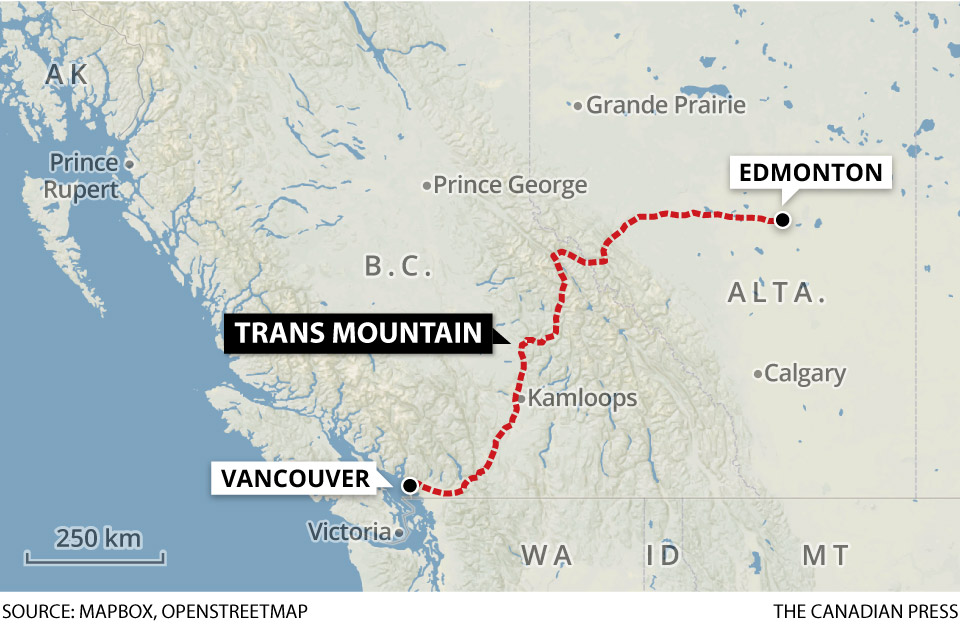A massive crowd of anti-pipeline demonstrators descended upon Burnaby Saturday morning to protest the expansion of the Trans Mountain pipeline.

Environmentalists and Indigenous leaders, including Coast Salish members who organized the Protect the Inlet event, banged drums and sang as they marched from the Lake City Way Skytrain station to the Kinder Morgan terminal on Burnaby Mountain.
The crowd of protesters near the train station quickly grew throughout the morning, as people arrived by train and bus from across Metro Vancouver, Vancouver Island, and the Southern Gulf Islands to join the rally.
By the time the protesters started marching to Kinder Morgan, at least a thousand people had gathered, with some estimating up to 10,000 had shown up by the time the massive crowd made it to Burnaby Mountain.
Organizers are hoping to delay Kinder Morgan’s tree-clearing work, which is set to be completed by March 26, in order to put the pipeline behind schedule.
The event is going forward despite Friday’s interim injunction that aims to prevent protesters from coming within 50 metres of the Burnaby and Westridge Marine terminals. Vancouver city councillor Adriane Carr said the injunction was a bold move.
“It’s a belligerent gesture. I mean I think its already steaking out the ground that it’s going to be a conflict,” said Carr. “It doesn’t need to be a conflict. This can be a peaceful protest.”
But at least one organizer who talked to police before the protest said the 50-metre rule won’t be enforced during the rally.

Get daily National news
A watch house was built by First Nations members just outside the 50-metre buffer zone. The wooden structure will be used by members to fix a gaze on the work being done by Kinder Morgan workers at the site.
Demonstrators say the event sends a clear message to Kinder Morgan that the pipeline will only be harmful to communities and the environment.
“I’m really concerned about putting a piece of infrastructure in that’s going to pump out tarsands and bitumen for 30 years,” Janet Silman said.
“We don’t have 30 years. We’ve got climate change happening now.”
Counter-protest planned
Meanwhile at least 200 people gathered at Vancouver’s Jack Poole Plaza Saturday afternoon to show their support for the pipeline, saying it will lead to job growth and renewed investment in Canadian energy.
WATCH BELOW: Hundreds attend a rally in support of the energy project, arguing it’s in the national interest. Paul Johnson reports.

The event was organized by Resource Works and other pro-energy groups, who are pushing the federal government to keep its promise to go ahead with the project.
Several people have reportedly travelled to Vancouver from Alberta to join the rally in favour of the pipeline.
Prasad Panda, Alberta’s energy critic and MLA for Calgary-Foothills, attended and spoke at the event.
Other speakers, including Skeena MLA and former Haisla Nation chief councillor Ellis Ross, spoke to the pipeline’s safety and importance to the economy in both B.C. and Alberta.
“I’m trying to get my people employment and trying to get them out of poverty and there are a lot of First Nations in B.C. and Canada that are trying to do the same thing,” said Ross.
“So all of those First Nations that don’t have that problem, that don’t have to deal with bringing in revenue and bringing employment for their members, good on you, congratulations.”
He said people should look at the scientific facts and research available before making up their minds about the project.
Background
The Trans Mountain pipeline expansion is set to increase the capacity of oil products flowing from Alberta to the B.C. coast to 890,000 barrels from 300,000 barrels.
The $7.4-billion project will expand an existing 1,150-kilometre pipeline between Edmonton and Burnaby.
The proposal was first put forward in 2013. The National Energy Board (NEB) approved the expansion in 2016, subject to 157 conditions.
The project will involve 980 kilometres of new pipeline, 12 new pump stations and 20 new tanks.
The new line will carry heavier oil, known as bitumen, diluted with a chemical condensate and pump close to 900,000 barrels a day. This would almost triple its current capacity.
Groups supporting the project estimate it will employ 15,000 workers during construction and create another 37,000 permanent jobs once it’s complete, with nearly a quarter of those jobs based in B.C.
~With files from Kyle Benning and the Canadian Press


































Comments
Want to discuss? Please read our Commenting Policy first.